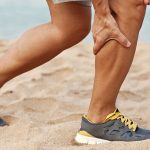 Overexposure to heat combined with inadequate rehydration can cause muscle cramping (calf cramping is common).
Overexposure to heat combined with inadequate rehydration can cause muscle cramping (calf cramping is common).
A painful condition resulting in involuntary muscle contractions due to loss of body fluids and electrolytes during heavy exercise.
Cramp produced by loss of salt from the body in very hot conditions.
A condition caused by prolonged activity in high temperatures that produces the sudden development of cramps in the skeletal muscles. Loss of water and salt (sodium chloride) through profuse perspiration obstructs the ability of the body to release heat, causing the muscles to cramp. A person who has heat cramps should stop exercising and move to a cool place. Tight clothing should be loosened, and the feet should be raised. Water and electrolyte solution, if available, should be given to the person. Cooling off and drinking water are important to help prevent heat stroke.
Painful cramps in the muscles occurring in workers, such as stokers, who labour in hot conditions. The cramps are the result of loss of salt in the sweat, and can be cured by giving the sufferer salty water to drink.
Skeletal muscle spasm caused by the excess fluid and/or electrolyte loss that occurs with profuse sweating. The usual muscles affected are those used during work (i.e., the hand, arm, or leg muscles). The cramps may come on during work or up to 18 hr after completing a work shift.
Heat cramps are painful muscle contractions that result from excessive sweating and salt loss. They typically occur during intense physical activity in extremely hot conditions. Heat cramps can manifest independently or as a symptom of heat exhaustion or heatstroke. To prevent and treat heat cramps, it is essential to stay well-hydrated by drinking plenty of fluids. In many cases, heat cramps will resolve on their own.
